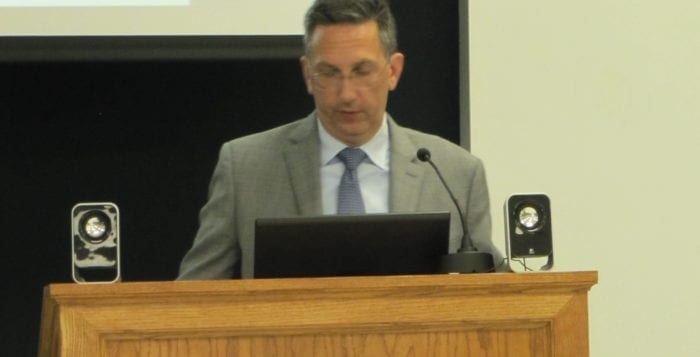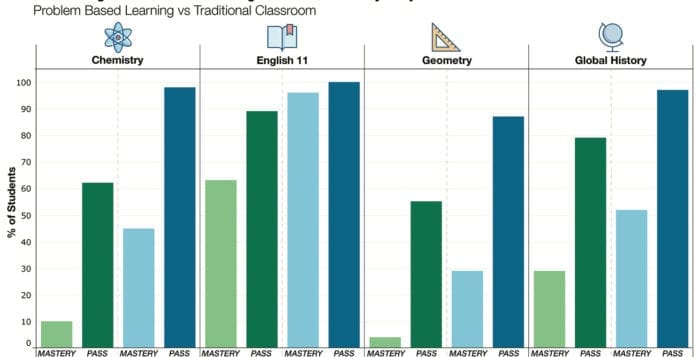Three Village school board discusses cell phones, including Regents exams in course grades
District parents should not expect more information about the surprise reassignment and investigation of Ward Melville High School’s principal, according to Three Village Superintendent of Schools Kevin Scanlon.
Due to federal and state privacy laws, district representatives can’t discuss personnel matters — and they won’t be able to even after the issue is resolved.
The board had an emergency meeting Wednesday, Nov. 8, after announcing the personnel change, with a public portion that lasted only a couple of minutes, time enough for the board to confirm the interim principal — Paul Gold, previously an assistant principal — and his compensation, as well as to vote to engage the services of Investigative Management Group.
District parent Qin Wu at the Nov. 15 board meeting spoke out in support of former principal William Bernhard and indicated parents were concerned for high school seniors.
“As a parent, I hope the investigation will be fair and transparent, and maybe even as soon as possible to resolve the issue and have everything come back to normal,” Wu said.
Scanlon told TBR News Media after the meeting that even though such transparency is not possible, Wu and other parents have nothing to worry about regarding their children’s education or the district’s reputation.
“I think the school is in good hands, and the acting administration is doing a wonderful job,” he said. “The educational system is still intact. Classes will remain, students will still go to college. No one’s going to be harmed that way,” adding, “If that is the fear that is being propagated, that’s wrong.”
Board president Susan Rosenzweig, a district parent herself, also spoke against percolating speculation and hearsay on social media. “Don’t buy in,” she advised. “Let due process take its place. It’s tough, I know.”
Regents exams as part of final grade
During the meeting, the board tabled any decision regarding the so-called “Do No Harm” rule, the policy of including Regents scores as part of a student’s final grade only if that score improves the grade.
The policy, which proponents say supports students who don’t test well, was instituted during the COVID-19 pandemic and temporarily extended last year after a group of parents petitioned the district.
Assistant Superintendent Brian Biscari shared the consensus recommendation that came after “tremendous discourse” by the district’s grading committee to include the exams at 10% — down from the 12% that has been the policy outside the reprieve of the last few years.
Biscari also took issue with the label “Do No Harm” since it implies acting in any other way will inflict harm on students, when part of the concern was that students may not take exams seriously if they don’t count toward final grades.
“It was a very student-centered conversation,” he said. “Never was the conversation about what the district is going to look like or how we’re going to present data. It was all in relation to students.”
But for freshman board member Karen Roughley, a long-time supporter of the policy, a 2% decrease is not enough. “There are many different ways to gauge a child’s understanding of the concepts than just sitting for one single test that means so much,” she said.
Biscari noted that some form of testing is required by the state, and removing any pressure from the Regents exam could backfire for students who need to take licensure exams or other higher-stakes tests in the future.
“We, as a district, would want to arm kids in how to address that anxiety and deal with it so they can effectively take tests, rather than eliminating that stress,” he said. “It’s almost an avoidance in some cases that we’re not teaching kids these skills that they are going to need in their lives.”
The board opted to wait on voting about the issue until it could hear forthcoming data from the state to see whether exam scores changed when students knew low scores would not be included in their final grade, and to learn more about how comparable Long Island districts are using Regents scores for classroom grades.
Cell phone policy
Scanlon also updated the board on the ongoing cell phone policy committee’s work, laying out the current thinking for parameters around student cell phone use in schools.
Currently the committee is ironing out how to best enforce the proposed new policy, though Scanlon emphasized that any consequences will be decided by building principals or the district, and will not be a one-size-fits-all consequence determined by a planning committee.
The board engaged the committee to look into changes after it became apparent that issues of use during instructional time, inconsistent enforcement across classes and cyberbullying were popping up at the secondary schools.
“It’s fully recognized by the teaching staff and the administration that cell phones are an issue, and then we heard loud and clear from the student representatives on the committee that yes, they agree, cell phones are an issue,” Scanlon said. “Everyone seemed to agree: We’ve got a problem.”
He said the final committee recommendations should be available for the Nov. 29 board meeting.









